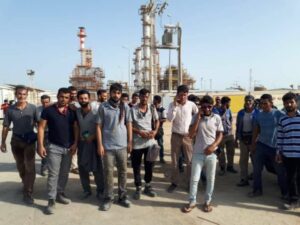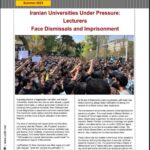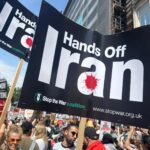
September 15, 2021
Strike actions in various locations across Iran, by project workers in the country’s oil and petrochemical sector, are continuing unabated, having originally begun on 19 June 2021 (the day after the theocratic regime’s sham presidential elections).
The main demands of the striking workers are the proper adjustment of wages in accordance with fair job categorisation, across Iran, as per the country’s Labour Code requirements; on-time monthly payment of wages; secure job tenure; proper ancillary benefits, including comprehensive healthcare; the ending of recruitment and employment via private labour brokers, thus direct engagement by the employer; as well as major improvements to be made to the filthy, unsanitary, and indeed hazardous conditions of the workers’ multi-occupancy dormitories onsite. These workers generally work according to an irregular rotation system (e.g. 24 days working onsite, 6 days off) and are demanding a rotation of 20 working days followed by 10 days of paid leave, so as to enable the workers to return to their families and homes before resuming their next work rotation. Other demands include receiving a copy of their contract of employment on official headed paper, signed and stamped by the employer, and that payments for work rotations lasting less than a month should be calculated pro-rata according to a proper index.
Through unions such as the Union of Metalworkers and Mechanics of Iran (UMMI), the strikers have called for international solidarity with their campaign. Among the many labour organisations around the world to support the striking Iranian project workers is the IndustriALL Global Union.
The Committee for Defence of the Iranian People’s Rights (CODIR) actively campaigns for global solidarity with these strikes in Iran, which have been very successful. (See CODIR’s appeal here.)
Despite the very real pressures and threats upon these strikers, their campaigns are continuing without relent. While in several cases the private labour brokers have been forced to cede to the demands of the workers, many are still attempting to hold out – often with the regime authorities positioned behind them. A representative affiliated with the UMMI is currently representing project workers’ demands and acting on their behalf in negotiations with the Iranian National Oil Company, which is the top tier client. 2,000 workers have signed a petition and assigned the UMMI representative as their recognised agent in these negotiations.
These strikes are unprecedented in the recent history of the labour movement in Iran in terms of their tenacity, demands, and level of organisation – and they are now producing results. The outcome of these organised actions could greatly boost the campaign of organised labour in Iran for the recognition of bona fide independent trade unions by the government.
A daily report published today on the UMMI website read: “Brothers! We have no choice but to come together and demand our rights in accordance with our campaign and prevent broker-contractors from stealing our take-home pay. Article 13 of the Labour Code gives us the right to receive our wages without delay, to have the employers pay their insurance contributions properly, to be provided with decent accommodation and amenities, and that the Ministry of Labour monitor these requirements and penalise employers should they violate them. We are united and will remain united!”
In its daily reports, the UMMI details the developments of the strikes, their progress and achievements, as well as the hurdles faced by these campaigns. In some cases, the labour brokers have attempted to recruit less-skilled workers to replace the striking professional industrial plumbers, welders, and the like, resulting in major problems for the projects – sometimes costing them even more than they would have paid had they just agreed to the increase requested by their skilled workers in the first instance. The project workers regularly communicate with each other to alert their workers on the plans of the employers and to advise their colleagues not to work for contract companies who obstruct the workers’ legitimate and righteous demands.













 Posted in
Posted in 











